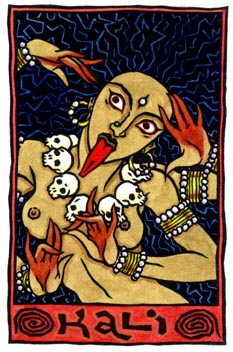
The Hindu Goddess Uma is this week's pick; this is Her first time here. Well, sort of.
The thing with Hindu Goddesses is that they tend to slide into each other, especially given that reincarnation is a tenet of Hinduism; Sati, for example, Shiva's wife, is said to have been reincarnated in Parvati. Kali, Who came up both last week and two weeks before that, can be considered an aspect or even emanation (to use that word imprecisely) of Parvati, or Sati, or Durga (Herself sometimes an aspect of Parvati), and could even reasonably be said to be the same Goddess as Uma. It is assumed that a Goddess, or the Goddess, has been worshiped in India since prehistoric times; in medieval times a Goddess called Devi, 'Goddess' or Mahadevi, 'Great Goddess' was said to be the underlying principle behind all Goddesses, and ultimately no less than the very essence of reality. The Mahadevi is especially associated with this particular cluster of Goddesses—Parvati, Durga, Uma, Gauri, Kali, &c.
Now to Uma specifically. She is an aspect, or emanation, or independent Goddess Who was later attached to Parvati or Sati, Who personifies, represents or incarnates the practice of devotion and asceticism. She is closely tied with Shiva, the God of ascetics, and said to be His wife (Such is Her fame, however, that Shiva is often called 'Husband of Uma'). Her power derives from Her ability to practice austerities and in Her renunciation of the world; and in this form Shiva, Who is also the God of the phallus and eroticism, cannot deny Her.
Her name is said to come from Her mother's reaction when She learned of Her daughter's desire to become an ascetic: U! Ma! She cried—No! Don't!
A Goddess called Uma Haimavati is mentioned in the Kena-upanishad, which probably dates to the first or second century CE; the name Haimavati means 'She Who Belongs to Himavat', Himavat being the God of the Himalaya Mountains. Uma Haimavati is in later writings a name for Sati-Parvati, and indeed Parvati's name means 'Daughter of the Mountain', Her father also being Himavat or the Himalayas. Uma Haimavati is earlier than Parvati, though, Who is not mentioned by that name in the Vedic texts; She was perhaps attached to Parvati at a later date, or the early mention of Uma was assumed to refer to Parvati, perhaps to give Parvati a more ancient provenance.
Sati, Shiva's first wife, is sometimes called Uma in the stories when Her devotion to Shiva is being emphasized. However, when Sati's father insulted Shiva, such was Her devotion to Shiva that She killed Herself; and Shiva, Who hadn't cared about the insult at all, mourned Her death with such world-destroying intensity that the other Gods had to resort to a ruse to get Him to stop.
Parvati, as the later reincarnation of Sati, was destined from birth to be married to Shiva; but Shiva Himself, perhaps a little wary of marriage after that experience, did not want any part of it at first. So She withdrew from Him, and devoted Herself to a fierce type of asceticism.
Parvati as Uma surpassed even the greatest sages in all the traditional austerities, such as standing on one leg for years, living on leaves and air, and sitting between four fires at the height of summer. This type of practice is believed in Hinduism to generate tapas, a kind of inner heat or fire; this fire can get so hot in the great sages that the Gods fear for the safety of the world. This is turn means They are usually more than willing to grant the practitioner a boon.
Now Uma had focused Her devotion on Shiva; so, in time, it was He Who came to grant her dearest wish. That dearest wish? That she marry Shiva. And, having proved Herself not only His equal but His type, He readily agreed.
This week looks to be a continuation of the themes in play for the last three weeks, since Kali, also an aspect of Parvati, first came up. The problem is the same one that had you reaching into the darkness and the depths and the destruction; but the focus this week is on the work that must be done with it. It is hard work, but good work, and not something you can't handle, I don't think. Find that focus, and let your mind run on one track for a while. You will be able to achieve more than you thought was possible.
What does She say?
Practicing denial of the flesh so that one may unite with the Beloved? It has its twisted logic, doesn't it? But I know what I'm doing. And so does He.
And so do you.

